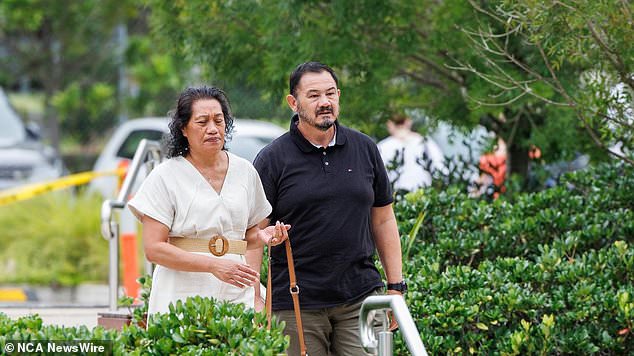‘Heartbroken’ Des Hasler grilled over key email warning at inquest into rising star’s death during training session at Manly Sea Eagles
Former Manly coach Des Hasler says he was not raised any “red flags” about Keith Titmuss’ fitness or the temperature on the day the rising rugby league star died after pre-season training.
The promising young forward lost consciousness at the team’s Narrabeen headquarters on Sydney’s northern beaches before later dying after suffering cardiac arrest.
A coronial inquest investigating his death has led several experts to conclude that 20-year-old Titmuss was suffering from heatstroke when he suffered a seizure after the first session of the NRL pre-season on November 23, 2020.
The inquest, before Deputy State Coroner Derek Lee, is examining the circumstances of the session, with the court hearing that the club was urged a year in advance to carry out heat readings before each outdoor session or risk ‘litigation’.
Mr Titmuss took part in a 90-minute cross-country session before heading inside to the club’s ‘dojo’ for a short 10-minute cardio session, doing exercises such as burpees and fire maneuvers.
Mr Hasler, now the Gold Coast Titans coach, told the court on Friday he entered the dojo while the players were stretching and was present when Mr Titmuss suffered cramps and later had a seizure.
Des Hasler was coach at the time and said there were no obvious red flags indicating the young player was in distress until it was too late
The court was told that Mr Titmuss returned to pre-season training weighing 116.8kg, four kilos heavier than when he was weighed in September at the end of the previous season.
Mr Titmuss also scored the lowest of all his teammates on a yo-yo test, a running exercise used to assess a player’s aerobic capacity.
When asked if there were any red flags regarding Mr Titmuss’ condition after the yo-yo test, Mr Hasler said: ‘No, other than it was one of the lower ones and it is an area we could improve.’
He also noted that Mr Titmuss was in ‘good shape’ despite gaining four kilos in the off-season.
When asked to rate how strenuous the training session was, Mr Hasler described it as a ‘six to seven’ out of ten.
At the time, Mr Titmuss was considered a rising star and was earmarked as a player of the future after being elevated into the club’s top 30.
Mr Hasler told the court on Friday that it was common for players to gain two to four kilos in the off-season.

Titmuss is destined to make his NRL debut and has been a rising star at the NRL club
He was pressed by counsel assisting Adam Casselden SC over whether the training session was too ‘demanding’ given Mr Titmuss’ score on the yo-yo test.
“It would have been a challenge… But there were planned outages so there was the opportunity to recover and rehydrate before moving to the next phase,” Mr Hasler said.
Mr Casselden questioned whether the session posed an “unnecessary risk” to Mr Titmuss given his level of conditioning at the time.
But Mr Hasler said there were breaks during the session and players were allowed to rest and recover.
He described it as a ‘longer, slower’ session that was recorded at a lower number of meters per minute on the players’ GPS data.
The court has heard that young NRL players sometimes felt pressured to push themselves during training for fear of falling out of favor with their coaching staff.
However, Mr. Hasler said he tried to foster an open relationship in which players felt comfortable.
“If they feel ill or feel like they’re not coping well, if they feel like they’re struggling or injured, (the club encourages) them to raise their hand and let us know,” said Mr. Hasler.
The court was told there were 10 members of staff, including Mr Hasler, his two assistant coaches, two physios and other high-performance staff who monitored the 15-player session for any sign of discomfort.

Hasler said there were breaks during the session and players were allowed to rest and recover

The Titmuss family searches for answers to how this tragedy could have happened
The court was told that the club’s then chief medical officer Luke Inman sent an email to Mr Hasler, Manly head of performance Don Singe and general football manager John Bonasera in 2019.
In the email he implored the club to carry out a kestrel reading, a handheld measurement of heat and temperature, before each training session.
In the email, Dr. Inman warned that the club would “open itself up to lawsuits” if a player suffered heatstroke or “worse still died.”
The inquest was previously told that a maximum temperature of 24.9 degrees Celsius was recorded in Terrey Hills on the day of the incident.
When asked if he remembered receiving that email, Mr. Hasler said “no.”
Mr Hasler said he could not recall any kestrel measurements being taken prior to outdoor training.
Asked if any concerns had been raised about the temperature, which ranged from 20ºC to 24ºC that day, Mr Hasler said: ‘No.’
“Keith was a beautiful boy, he was very loved, very highly regarded and very respected,” Mr Hasler said as Mr Titmuss’ family sat in the back of the room.
“I’m so sorry and I share your heartbreak, I truly am.”
